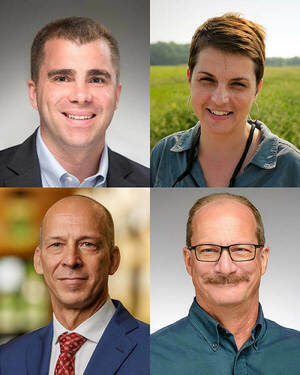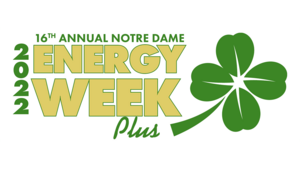Energy Week: From Carbon Capture to Artificial Food: The Complexities of Future Choices

Engineers and scientists are working toward the day when excess carbon from the atmosphere will be used to develop artificial carbohydrates in the lab. When done to scale, this could reduce the adverse effects of modern agriculture while alleviating world hunger and slowing global warming.
There are many positive outcomes from this scenario; are there also negative ramifications? Is it realistic? Can it be done? Just because we can do it, should we? History is loaded with examples of solutions not living up to their promise or becoming problems. What are the ethical and social implications of a future where labs could drive those working in agriculture out of business? Should guardrails be set, and if so, by whom? Will people consume “artificial food” or be more concerned about disruptions to the natural order?
Join a conversation with a panel of Notre Dame faculty while they debate the pros and cons of creating food in the lab as a way to fight climate change. Casey O’Brien, assistant professor in the department of chemical and biomolecular engineering, will present the technical concepts of cooling the earth while creating food. Jennifer Tank, director of the Notre Dame Environmental Change Initiative (ND-ECI), and the Ludmilla F., Stephen J., and Robert T. Galla Professor of Biological Sciences, will offer her expertise from her perspective as an ecologist, based on experiences working at the intersection of agriculture and freshwater. Paul Winters, the Keough-Hesburgh Professor of Global Affairs, an agricultural economist, has worked firsthand with food insecurity around the world. He evaluates policies and programs that address rural agriculture and poverty.
The discussion will be moderated by Peter C. Burns, Henry J. Massman Professor of Civil and Environmental Engineering and Earth Sciences and director of ND Energy.
Biographies
Casey O'Brien is an assistant professor in the department of chemical and biomolecular engineering at the University of Notre Dame. His research focuses on reducing the environmental impact of the chemical industry by developing new catalytic materials. O'Brien recently received a National Science Foundation (NSF) CAREER award for a project focused on developing an innovative type of catalytic membrane for capturing carbon dioxide and converting it into useful products.
Jennifer Tank is the director of the University of Notre Dame Environmental Change Initiative (ND-ECI) and the Ludmilla F., Stephen J., and Robert T. Galla Professor of Biological Sciences at the University of Notre Dame. Her research focuses on nutrient and carbon cycling in streams and rivers and the influence of human activities on water quality and stream health. An international authority on the cycling of nutrients in freshwater ecosystems, Tank has published over 160 peer-reviewed journal articles on nitrogen and carbon cycling in streams and rivers.
Paul Winters is the Keough-Hesburgh Professor of Global Affairs at the University of Notre Dame. He also is the director of the sustainable development concentration for the Master of Global Affairs program. His research and teaching focus on rural poverty and food insecurity and the evaluation of policies and programs designed to address these issues. Winters has published numerous journal articles and working papers in the areas of rural poverty and food insecurity, rural development, small-scale agriculture, inclusive and sustainable food systems, agricultural data, impact evaluation, migration and social protection programs.
Peter C. Burns has focused most of his research over the past decade on the solid-state chemistry, mineralogy, and environmental chemistry of uranium, as well as the transuranic elements neptunium and plutonium. The Burns lab uses many diffraction, scattering, and spectroscopic techniques to study actinides at various length scales. Burns is the Henry J. Massman Professor of Civil and Environmental Engineering and Earth Sciences and concurrent professor in the Department of Chemistry and Biochemistry. He was named Director of the Center for Sustainable Energy at Notre Dame (ND Energy) in July 2014. He earned his Ph.D. at the University of Manitoba in 1994.
ND Energy t-shirts will be handed out to early arriving students.
Downloads:
Carbon Capture to Artificial Food Screen Ad (JPG)

Originally published at energy.nd.edu.